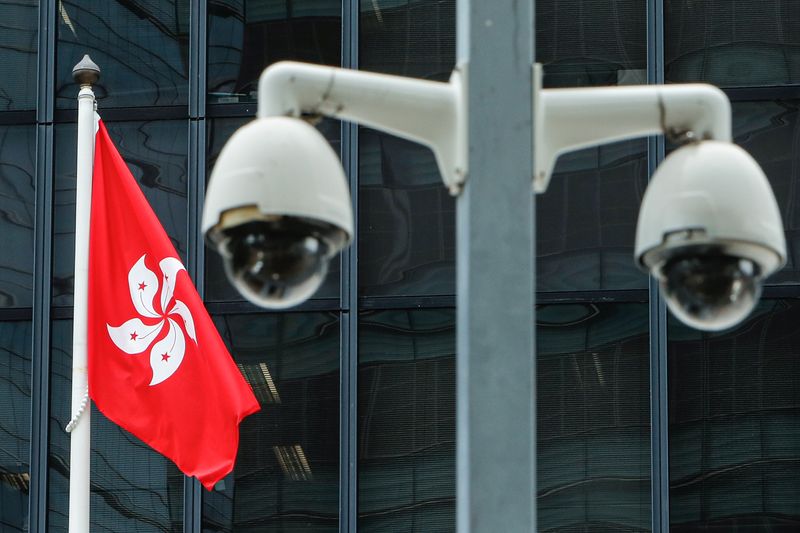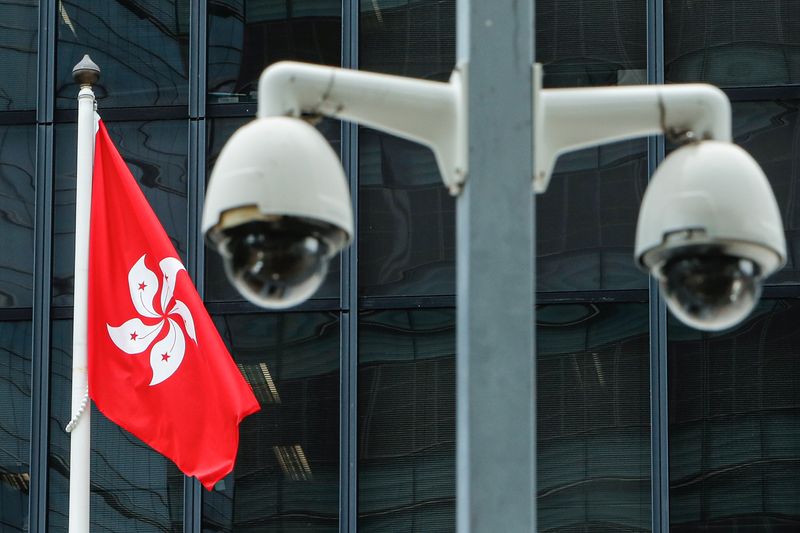Stock Markets
Hong Kong issues new national security law bill with tougher jail terms


© Reuters. A Hong Kong flag is flown behind a pair of surveillance cameras outside the Central Government Offices in Hong Kong, China July 20, 2020. REUTERS/Tyrone Siu
By Jessie Pang, James Pomfret and Greg Torode
HONG KONG (Reuters) -Hong Kong on Friday published its draft of a new national security law, a document some lawyers said broadened what could be considered sedition and state secrets, with tougher penalties for any one convicted of those crimes and several others.
The draft, which also includes new laws encompassing treason, espionage and external interference, is being closely watched by foreign diplomats and businesses who fear it could further dent freedoms in the financial hub already subjected to a China-led crackdown on dissent that has sent many pro-democracy politicians and activists into jail or exile.
The Legislative Council started debating the bill on Friday amid tight security, and several members of the largely pro-Beijing body told reporters they expected the bill to be passed into law before mid-April.
Hong Kong leader John Lee had earlier urged lawmakers to pass the bill “at full speed”.
“The geopolitics have become increasingly complex, and national security risks remain imminent,” a government statement said.
Some lawyers analysing the draft said, at first glance, elements of the revised sentences for some listed offences are similar to Western ones but some provisions, such as those for sedition and state secrets, are broader and potentially tougher.
The bill includes sentences of up to life imprisonment for treason, insurrection and sabotage, 20 years for espionage and 10 years for crimes linked to state secrets and sedition.
The European Union, in a statement to Reuters, said it had made clear in a diplomatic note its “grave concerns” over the far-reaching provisions in the bill on “external interference” and the law’s extra-territorial reach.
The draft bill, however, noted some rights provisions.
“Human rights are to be respected and protected, the rights and freedoms, including the freedoms of speech, of the press and of publication, the freedoms of association … are to be protected” the bill read.
Some investors said the desire to fast-track the bill was concerning.
“The fact they are rushing through article 23 shows concern about public opposition. The business community is going to be unhappy unless there are guard rails protecting individual rights,” Andrew Collier, managing director at Hong Kong-based Orient Capital Research told Reuters.
Simon Young, a law professor at the University of Hong Kong, also said the broad definitions of crimes, especially those linked to foreign interference and collusion, could prove challenging to firms.
“It may well be that businesses or groups that have some connection with foreign governments might fall under the radar as an ‘external force'”, Young said.
CONCERNS OVER FREEDOMS
Hong Kong has long been a business, academic and media hub for China and the region, but in recent years critics say the rule of law and freedom of information have been undermined.
Hong Kong and Chinese officials have said the draft was similar to laws in some Western nations and that it was necessary to plug “loopholes” in the national security regime.
That regime was bolstered in 2020 by another law imposed directly by China which at the time said it was aimed at restoring stability after pro-democracy protests a year earlier.
The debate on the Hong Kong bill coincides with a move by China’s top lawmakers to create a slew of new national security laws in order to safeguard the mainland’s sovereign interests.
The Hong Kong bill proposed extending police detention for those arrested, without charge, for up to 14 days with a magistrate’s approval and potentially limited access to lawyers, compared to 48 hours currently.
The sentences for sedition, defined as inciting disaffection or hatred towards authorities through acts, words or publications, have been expanded from two to up to 10 years for offences in collusion with foreign forces.
Critics, including media advocacy groups, had earlier called for sedition to be scrapped, noting its potential use to silence freedom of expression and the media.
The bill proposes a jail term of up to 3 years, up from one year, for possessing a seditious publication and police have the right to search any premise to seize and destroy such material.
The definition of state secrets also appears quite broad, some lawyers said, saying it includes military, security and diplomatic secrets as well as classified social, economic and technological information involving China and Hong Kong governments, and their relationship.
Stock Markets
Suburban Propane director Logan sells $139k in shares
Stock Markets
Stock market today: S&P 500 closes lower, but posts big weekly win
Stock Markets
TD Bank promotes Laura Nitti to retail market president role

 Forex3 years ago
Forex3 years agoForex Today: the dollar is gaining strength amid gloomy sentiment at the start of the Fed’s week

 Forex3 years ago
Forex3 years agoUnbiased review of Pocket Option broker

 Forex3 years ago
Forex3 years agoDollar to pound sterling exchange rate today: Pound plummeted to its lowest since 1985

 Forex3 years ago
Forex3 years agoHow is the Australian dollar doing today?

 Cryptocurrency3 years ago
Cryptocurrency3 years agoWhat happened in the crypto market – current events today

 World3 years ago
World3 years agoWhy are modern video games an art form?

 Commodities3 years ago
Commodities3 years agoCopper continues to fall in price on expectations of lower demand in China

 Economy3 years ago
Economy3 years agoCrude oil tankers double in price due to EU anti-Russian sanctions



























